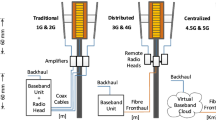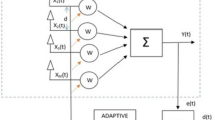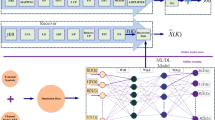Abstract
This paper addresses the problem of designing joint optimum precoder and decoder for multiple-input multiple-output communication system. Conventionally, most of the joint precoder and decoder designs are based on the sum power constraint (SPC) at the transmitter and perfect channel state information (CSI). However, in practice, per-antenna power constraint is more realistic as the power at each transmit antenna is limited individually by the linearity of the power amplifier. Further, the estimate of CSI cannot be obtained perfectly by any methods. Under imperfect CSI, the aim is to design jointly optimum precoder and decoder subject to a power constraint that jointly meets both per-antenna and SPCs. The objective function is formulated into an optimization problem that minimizes the mean square error in estimating the transmitted signal. The simulation results show that the proposed scheme has a near-optimum performance under practical constraints.





Similar content being viewed by others
References
Zhang, X., Xie, Y., Li, J., & Stoica, P. (2007). MIMO transmit beamforming under uniform elemental power constraint. IEEE Transactions on Signal Processing, 55(11), 5395–5406.
Lo, T. K. Y. (1999). Maximum ratio transmission. IEEE Transactions on Communications, 47(10), 1458–1461.
Love, D. J., & Heath, R. W, Jr. (2003). Equal gain transmission in multiple input multiple-output wireless systems. IEEE Transactions on Communications, 51(7), 1102–1110.
Palomar, D. P. (2004). Unified framework for linear MIMO transceivers With shaping constraints. IEEE Communications Letters, 8(12), 697–699.
Feiten, A., Mathar, R., & Hanly, S. (2007). Eigenvalue based optimum power allocation for Gaussian vector channels. IEEE Transactions on Information Theory, 53(6), 2304–2309.
Sampath, H., Stoica, P., & Paulraj, A. (2001). Generalized linear precoder and decoder design for MIMO channel using the weighted MMSE criterion. IEEE Transactions on Communications, 49(12), 2198–2206.
Yang, J., & Roy, S. (1994). On joint transmitter and receiver optimization for multiple-input-multiple-output (MIMO) transmission systems. IEEE Transactions on Communications, 42(12), 3221–3231.
Scaglione, A., Stoica, P., Barbarossa, S., Giannakis, G. B., & Sampath, H. (2002). Optimal designs for space-time linear precoders and decoders. IEEE Transactions on Signal Processing, 50(5), 1051–1064.
Palomar, D. P., Cioffi, J. M., & Lagunas, M. A. (2003). Joint Tx–Rx beamforming design for multicarrier MIMO channels: A unified framework for convex optimization. IEEE Transactions on Signal Processing, 51(9), 2381–2401.
Khaled, N., Leus, G., Desset, C., & De Man, H. (2004). A robust joint linear precoder and decoder MMSE design for slowly time-varying MIMO channels. In Proceedings IEEE ICASSP 2004 (Vol. 4, pp. 485–488).
Zhang, X., Palomar, D. P., & Ottersten, B. (2005). Robust design of linear MIMO transceiver for low SNR. In Proceedings of the 39th Asilomar conference signals, systems and computers (pp. 398–402).
Zhang, X., Palomar, D. P., & Ottersten, B. (2006). Robust design of linear MIMO transceiver under channel uncertainty. In Proceedings of the ICASSP (Vol. 4, pp. 77–80).
Palomar, D. P. (2003). A unified framework for communications through MIMO channels. Ph.D. Dissertation. Barcelona: University of Politécnica de Catalunya (UPC).
Ding, M., & Blostein, S. D. (2009). MIMO minimum total MSE transceiver design with imperfect CSI at both ends. IEEE Transactions on Signal Processing, 57(3), 1141–1150.
Ding, M., & Blostein, S. D. (2010). Maximum mutual information design for MIMO systems with imperfect channel knowledge. IEEE Transactions on Information Theory, 56(10), 4793–4801.
Xiao, C., Zheng, Y. R., & Ding, Z. (2011). Globally optimal linear precoders for finite alphabet signals over complex vector Gaussian channels. IEEE Transactions on Signal Processing, 59(7), 3301–3314.
Vu, M., & Paulraj, A. (2007). MIMO wireless linear precoding. IEEE Transactions on Signal Processing, 24, 86–105.
Hjorungers, A., Gesbert, D., & Palomar, D. P. (2007). Unified theory of complex-valued matrix differentiation. In Proceedings of the ICASSP (pp. 345–348).
Author information
Authors and Affiliations
Corresponding author
Rights and permissions
About this article
Cite this article
Merline, A., Thiruvengadam, S.J. Design of Optimal Linear Precoder and Decoder for MIMO Channels with Per Antenna Power Constraint and Imperfect CSI. Wireless Pers Commun 75, 1251–1263 (2014). https://doi.org/10.1007/s11277-013-1421-4
Published:
Issue Date:
DOI: https://doi.org/10.1007/s11277-013-1421-4




